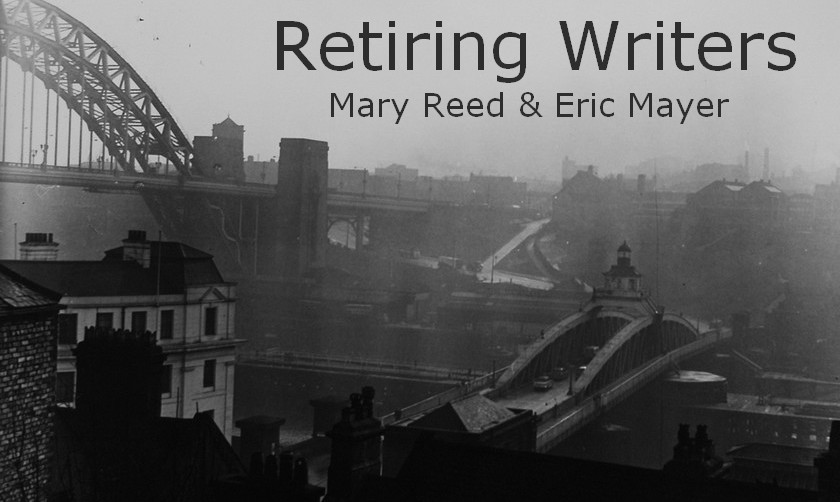Shakespeare's Macbeth isn't out of place in this newsletter. While not a mystery it can certainly be classified as a crime story. There's a large enough body count. One Internet source tallies eight murders. But I don't want to write about the play itself. My subject is the performance I saw in 1974 at the Mitzi E. Newhouse Theater at Lincoln Center in New York City.
The theater has about three hundred seats, the rows curving around a thrust stage more or less creating half of a theater in the round. The whole audience is practically on top of the action. For this production the stage was covered by various levels of metal gratings. Most of the actors carried swords and wore heavy boots and dark bulky outfits with numerous metal fittings. They clanked and rattled across the gratings looking huge in the dim lighting. The set was stark. Chairs, a table, a cauldron for the witches.
All impressive and spooky but when Macbeth strode onto the stage a remarkable thing happened.
What is stage presence? Good acting? Appearance? An attitude? A psychic projection? However it might arise, after seeing this performance of Macbeth I have no doubt it exists. The actor filled the theater with the enormous force of Macbeth's personality. You couldn't look away.
On my way out, feeling almost stunned, I asked one of the ushers "Who was that?"
"Christopher Walken," she replied, rather incredulously, apparently shocked that I didn't know him or maybe just surprised I had neglected to read my Playbill.
Walken was already well known to New York theatergoers but had appeared in only a few movies. Stardom and the Academy Award for The Deer Hunter came later. Over the years he seems to have been relegated mainly to playing villains which strikes me as a terrible waste of talent. Maybe the magnetism I felt during his Macbeth can't be captured by film. I was thrilled to see the Avengers' Patrick McNee in Sleuth at a tiny, regional theater, but though I loved his television performance as Steed and his portrayal of mystery writer Andrew Wyke on stage was excellent, I can't honestly say he had great stage presence, at least for me.
I haven't seen many famous actors on stage. I thought Frank Langella as Dracula had less presence than Edward Gorey's stage settings. Strangely enough, Carol Channing in a frothy show designed for her had whatever it is and then some. And I never even liked her. Chatting with talk show hosts she struck me as too gushing and phony. Yet seeing her in person I absolutely believed in her sincerity. It felt like she created some sort of psychic bond with every person in the audience. Jason Robards -- I don't know. Can stage presence reach the nosebleed seats where you need binoculars to recognize the actors?
For what it's worth I saw Blondie close up on the CBGB bar/rock club's poor excuse for a stage. Debbie Harry basically jumped up and down in a little pink dress and much as I love Blondie's music she didn't rivet my attention. To be fair I was sitting practically next to the sound man (CBGBs in cramped to put it mildly) who fiddled in apparent desperation with switches and dials and buttons muttering things like "Twenty-five thousand dollars worth of sound equipment and a twenty-five cent voice." Which I think totally inaccurate after listening to Debbie Harry's recordings many times over the years.
However, I can say for certain that lesser known singer and actress Quinn Lemley has presence in abundance. When Mary and I saw her one-woman show about Rita Haworth in a tiny dinner theater, she walked over to the edge of the stage in her slinky dress, a couple feet from where we sat, and sang The Heat Is On directly to me. So....
While trying to get my facts straight (if only I could google my memory) I managed to find a listing for the Macbeth performance I saw. As my gaze passed over the cast list I suddenly stopped. Banquo was played by Christopher Lloyd -- Reverend Jim in Taxi and Doc Brown in Back to the Future. Well, how do you like that, I thought.
But wait. Peter Weller portrayed Lennox. The name sounded familiar. Let's see...he was Robocop! And there was another name I recognized -- Carol Kane who was also in Taxi and plenty of movies. Heck, she was only one of the witches! Who would have guessed she'd go on to marry Latka?
I looked up the rest of the cast. Practically every one had long careers and a Wikipedia entry. Without knowing it I'd seen Stephen Collins (Macduff) in Star Trek: The Motion picture, John Heard (Donalbain) and Jason Tolkan (Rosse) in the Home Alone films. Some of the actors I might have glimpsed in shows I watched, like Hill Street Blues. Others were in shows I've heard about: The Sopranos, Dark Shadows, the Doctors, and more.
Realistically it's pretty likely you'll see a lot of actors who are successful or headed for success in a New York City production so my experience was not, I am sure, very unusual. Still, it amazed me that I had seen unknowingly so many actors I'd watch in the future all on the same stage that long ago afternoon. Remarkable isn't it how the Internet can alter and even enhance our own memories? Or perhaps that's scary.










